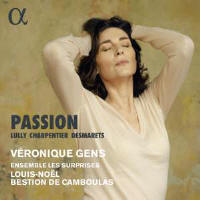Texte paru dans: / Appeared in: |
|
|
Outil de traduction (Très approximatif) |
|
|
Reviewer: Richard Lawrence A couple of years ago, Alpha issued ‘L’opéra des opéras’ (4/19), a new pasticcio made up of airs and other pieces by 15 composers of the French Baroque. Now comes ‘Passion’ – an imaginary opera, which calls on just four: Lully, Charpentier, Desmarets and – omitted from the cover – Collasse. There are five ‘acts’, each with a title – ‘The Call of the Underworld’, ‘Cruel Love’ and so on – but it really doesn’t matter if, like me, you find it hard to discern a plot. Louis-Noël Bestion de Camboulas, the excellent conductor, has devised a clever sequence: note, for instance, how neatly Lully’s ‘Air de la nuit’ from Le triomphe de l’Amour moves into Desmarets’s ‘Choeur du sommeil’ from La Diane de Fontainebleau. The note by Benoît Dratwicki, who planned the earlier disc, tells us that this recital is based on the repertoire of two singing actresses: Mlle Saint-Christophe (Christian name unknown), who joined the Opéra in 1675, and Marie Le Rochois, who succeeded her in 1683. He is silent, however, on the music. Lully accounts for 15 of the 21 tracks. Of the other three composers, Pascal Collasse is probably the least known. A former pupil of Lully, it was he who completed his master’s unfinished last opera, Achille et Polyxène. Juno’s air, ‘Calme tes déplaisirs’, leads straight into the splendidly vigorous storm from Thétis et Pélée, fast repeated notes in the orchestra provoking terror from the chorus. The air from Desmarets’s Circé, where Aeolia laments the supposed death of Ulysses, is a flowing chaconne that starts in the major and ends in the minor key. Charpentier is more familiar territory: the second number from Médée has the sorceress (not the chorus, as the booklet states) summoning a company of demons, sung with gusto by Les Chantres. The excerpts by Lully range chronologically from a brief dance from Le bourgeois gentilhomme (1670) to a substantial air from Armide (1686). In the latter, Véronique Gens is competing with her younger self in the first of her three ‘Tragédiennes’ albums (Virgin/Erato, 8/06). If the older recording is more vivid, the reason lies in the powerful swelling of Christophe Rousset’s violins in the introduction. Here, as there, Gens is in thrilling voice. She has the knack – harder, surely, in miscellaneous pieces than in a complete opera – of instantly getting to the heart of a character. This is apparent from the first number, from Armide, where, abetted by solemn low oboes, the sorceress Arcabonne addresses her entombed brother. In an extended scene from Proserpine (tracks 8 and 9), Ceres laments the abduction of her daughter, then furiously commands her followers to burn the crops of which she is the goddess: Gens enacts all this vividly and powerfully. The Ensemble Les Surprises provide variety with a few short orchestral pieces; a special word of praise for Juliette Guignard’s soulful gamba in Lully’s ‘Sarabande Dieux des Enfers’. Warmly recommended. |
|




